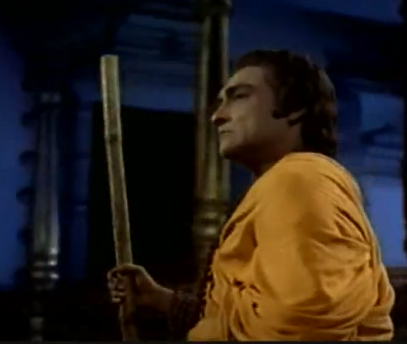
Rekha nails the aadab in the introduction to salaam-e-ishq merii jaa.n from Muqaddar Ka Sikander (1978)
Today, we present the lyrics and English translation of “Salaam-E-Ishq Meri Jaan” from Muqaddar Ka Sikander (1978).
Directed by Prakash Mehra, the blockbuster film Muqaddar Ka Sikander became the third highest grossing movie of the ’70s (following Sholay and Bobby) for its mass appeal as a classic masala entertainer. With an all-star cast and a convoluted plot, the film portrays the trials and tribulations of Sikander (Amitabh Bacchan) as he navigates through life’s struggles – from an unfortunate childhood as a poor orphan to a troubled young man with a doomed love.
The soundtrack of this film, composed by the underrated duo Kalyanji-Anandji and penned by Anjaan (Lalji Pandey), was a hit when the movie released and remains popular to this day. Notable gems include rote hue aate hai.n sab by Kishore, o saathii re by Kishore/Asha, and dil to hai dil by Lata. However, the highlight of the film’s soundtrack is the Lata-Kishore duet salaam-e-ishq meri jaa.n, whose lyrics have interestingly been credited to the film’s director Prakash Mehra. Although Rekha’s role in the film is small, she shines in her performance of this mujra number and shares great on-screen chemistry with Amitabh. No one can play the sulking courtesan like Rekha can, am I right?
For the musically inclined, this song is based on Raga Yaman Kalyan with a touch of Puriya Dhanashri when Kishore sings the second antara.
This song was requested by one of our dear readers Salma – thank you! Until next time…
-Mr. 55

Rekha looks great, but what was Amitabh’s costume designer thinking here?
Salaam-E-Ishq Meri Jaan: Lyrics and English Translation
ishqvaalo.n se na puuchho ki unkii raat kaa aalam
Do not ask lovers about how their nights
tanhaa kaise guzartaa hai?
pass in solitude.
judaa ho hamsafar jiskaa voh usko yaad kartaa hai
Those separated from their companions reminisce about them.
na ho jis kaa koii voh milne kii fariyaad kartaa hai
Those who are alone pray to meet their beloved.
salaam-e-ishq merii jaa.n zaraa qubuul kar lo
My dear, accept these greetings of love.
tum ham se pyaar karne kii zaraa-sii bhuul kar lo
Make the small mistake of falling in love with me.
meraa dil bechain hai hamsafar ke liye
My heart is restless for a companion.
mai.n sunaauu.n tumhe.n baat ik raat kii
I shall tell you the story of one night.
chaa.nd bhii apnii puurii javaanii pe thaa
The Moon was shining in full splendor.
dil me.n tuufaan thaa, ik armaan thaa
In my heart, there was a storm, a desire.
dil kaa tuufaan apnii ravaanii pe thaa
This storm in my heart raged with full vigor.
ik baadal udhar se chalaa jhuum ke
A cloud danced its way from afar
dekhte dekhte chaa.nd par chhaa gayaa
and cast its shadow over the Moon.
chaa.nd bhii kho gaya uskii aaghosh me.n
The Moon was lost in its embrace.
uff! yeh kya ho gaya josh hii josh me.n?
Oh! What has happened amidst such passion?
meraa dil dhaDkaa
My heart beat.
meraa dil taDpaa kisii kii nazar ke liye
My heart pined for someone’s glance.
KISHORE: is ke aage kii ab daastaa.n mujh se sun
Now hear the rest of the story from me.
sun ke terii nazar Dab-Dabaa jaayegii
After hearing it, your gaze will fall.
baat dil kii jo ab tak tere dil me.n thii
The innermost thoughts that have resided in your heart,
meraa daavaa hai ho.nTho.n pe aa jaayegi
I guarantee that they will surface to your lips.
tuu masiiha muhabbat ke maaro.n kaa hai
You are the Messiah for the lovestruck.
ham tera naam sun ke chale aaye hai.n
After hearing your name, I have come to your side.
ab davaa de hame.n yaa tuu de de zahar
Now give me your medicine or give me poison.
terii mahfil me.n ye diljale aaye hai.n
Many of your admirers have arrived in this gathering.
ik ahsaan kar apne mahmaan par
Do a favor for your guests,
de.n duaaye.n
for they will give you blessings.
de.n duaaye.n tujhe umr bhar ke liye
They will give you blessings for the rest of your life.
LATA: salaam-e-ishq merii jaa.n zaraa qubuul kar lo
My dear, accept these greetings of love.
Glossary:
aalaam: condition, atmosphere; fariyaad: prayer; salaam-e-ishq: greetings of love; qubuul karnaa: to accept; bhuul: mistake; bechain: restless; hamsafar: companion; javaanii: youth, splendor; tuufaan: storm; armaan: hope, desire; ravaanii: vigor; baadal: cloud; chhaa jaanaa: to cast a shadow; aaghosh: embrace; josh: passion; taDpaanaa: to pine; daastaa.n: story; Dab-Dabaa jaanaa: to sink, fall; daavaa: promise, guarantee; masiiha: Messiah; muhabbat ke maaro.n: the lovestruck; davaa: medicine; zahar: poison; diljale: admirer; ahsaan: favor; mahmaan: guest; duaaye.n: blessings; umr bhar: life-long.

Of course, no mujra number is complete without some groveling from a drunk hero.









